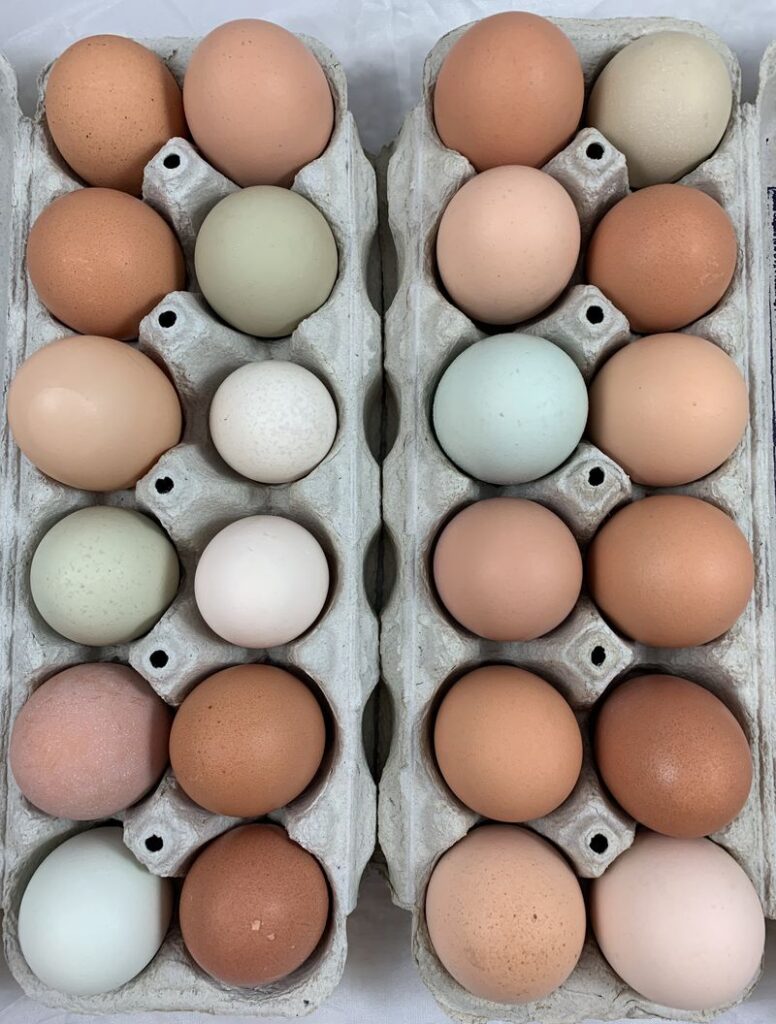Read about the farm (and the beautiful farm fresh eggs that we sell at the farmstand) in this great article by Lynne Sherwin for the Cleveland Plain Dealer, published on April 13, 2022 in the food section.


CLEVELAND, Ohio — For centuries, eggs have been revered as a symbol of spring, renewal and the circle of life.
Jennifer Jacobs knows all about new life. As the fourth-generation owner of Jacobs Heritage Farm in Copley, she’s surrounded by it.
On a chilly spring day, she showed off a day-old lamb; the pen soon to be occupied by geese, next door to the coop with its four babbling chickens; a friendly goat named Goat, begging like a dog to be scratched; and the bounty of her farm stand, full of products raised, made or gathered by Jacobs and fellow farmers.
And in the crook of her left arm nestled her one-month-old son, Frankie.
“My family’s been here since 1919, so just over 100 years now; that makes it a century farm,” she said.
The farm itself is even older, the house and barn dating back to 1859. Frank Jacobs Sr. and his wife, Agnes, were Hungarian immigrants who purchased it and ran it as a produce farm, passing it down to Jennifer’s grandparents, Frank Jr. and Vilma.
“My grandparents quit farming it in the early ‘70s because they were crop farmers, and there wasn’t any money in it anymore. And they were getting older. So, it just sat until 1980, when my uncle turned the farm into a golf course,” Jacobs said.
When Copley Greens closed in 2014, she bought the property back from her uncle and started slowly turning it back into a working farm.
“My baby’s going to be the fifth generation, which is great. My sister and I had never had kids so it was going to end with us,” Jacobs said.
Now, with the arrival of Frankie — who carries the name of his grandfather, great-grandfather and great-great-grandfather — “it’s gonna keep going. That’s cool. It’s meant to happen, I think.”
Depending on the time of year, the farm’s residents include ducks, chickens, quail, sheep, geese, goats, Mangalitsa pigs, honeybees and a Tennessee walking horse. The year-round roadside stand, which operates on the honor system, offers eggs from various types of fowl, heritage meats, produce, preserves, honey, soap, candles and more, changing with the seasons.
Many products come from farming friends, such as this day’s supply of chicken, turkey and goose eggs from nearby Zachry Farms in Norton. Farmers used to be more competitive, Jacobs said, but many have realized they can do more when they collaborate rather than trying to do everything themselves. “I’d rather support the other farms that are already trying to sell their eggs” and have bigger flocks, she said.
Her three hens provide enough for her family. One is a fluffy white Silkie, and the other two are an old German breed known as Deathlayers. “It’s a very metal name,” Jacobs said with a laugh. “Most chickens will quit laying after a few years, but Deathlayers will lay their whole lives until they die.”
The farm stand does steady business, selling as many as to 20 to 30 dozen chicken eggs per week in a natural rainbow of colors — no Easter dye needed. Jacobs’ quail are just beginning to produce their tiny, brown-speckled eggs for sale, and geese will arrive at her farm in June, to be raised both for eggs, and to butcher for Christmas roasting. R&D Microfarm in Rootstown often brings duck eggs.
No matter the type of fowl, Jacobs said farm eggs offer benefits that the mass-produced supermarket cartons don’t.
“The chickens are happy, for one. I think that makes the biggest difference. And they’re eating a variety of food out on pasture, eating bugs and grains and little things they find out there in addition to their feed, which makes it more nutrient-dense,” she said.
“If you crack one of these open next to a store-bought [egg], the store-bought has a really pale, yellow yolk, and these have a real rich yellow yolk … Most people, once they’ve had farm eggs, don’t go back. The flavor’s so much better.”
In “The Fresh Eggs Daily Cookbook” (Harper Horizon, 2022, $27.99), blogger and media personality Lisa Steele of FreshEggsDaily.com backs up Jacobs’ assessment: “After your first bite of egg from a happy, healthy backyard chicken who fills up on weeds and grasses, bugs, and edible flowers and herbs, you’ll immediately understand the difference.”
She cites studies showing eggs from chickens allowed to range freely “contain, on average, a third less cholesterol, one-quarter less saturated fat, two-thirds more vitamin A, two times more omega-3 fatty acids, three times more vitamin E, and seven times more beta-carotene than eggs laid by the typical commercially raised, factory-farmed hen.”
Both Jacobs and Steele say most descriptors on commercial egg cartons, such as “organic” and “cage-free,” don’t mean a lot. Steele writes that if you don’t have access to a farm stand or market, look for the words “certified humane pasture-raised” on the carton for the best quality.
While some people think brown eggs are healthier, shell color is merely aesthetic and derives from the breed of chicken, according to both Steele and Jacobs.
Eggs from other fowl may not taste noticeably different from chicken eggs, but their size must be taken into consideration in cooking, especially for baking. A goose egg is the size of a small fist, while a quail egg is only about 1 1/4 inches long, tiny enough to fry and perch on a cracker.
Jacobs is partial to duck eggs, which she said have a richer taste. Some of her customers like to use them in baking for that reason, and they sell quickly at her stand.
“The most nutrient-packed are these tiny little quail eggs. They have a higher yolk to white ratio. Cultures all over the world eat them because they’re extremely good for you, so many vitamins,” she said. “I have a lot of European customers and Middle Eastern. They like them and miss them from the old country.”
“The Fresh Eggs Daily Cookbook” contains plenty of recipes as well as cooking tips for even the most elementary preparations. Bored with basic sunny-side-ups? Try adding thin slices of lemon to the skillet, or using cream in place of butter or oil, or basting the top of the egg using the hot melted butter from the pan. If you’re scrambling them, instead of whisking, shake the raw eggs in a pint jar to incorporate more air and make the finished product fluffier.
More egg tips from Steele:
• Temperature can affect how they behave in recipes. Eggs will separate more easily when they’re cold. But allow them to come to room temperature before adding them to a batter or beating whites. Leaving them on the counter for 30 minutes or setting them in a bowl of warm water for 10 minutes, will take the chill out.
• If a recipe calls for just whites or yolks, you can freeze the unneeded portion. Better yet, find another use for them: Whites can be used for a wash on baked goods, macarons, merengue, souffle, foam on a whiskey sour or angel food cake. Yolks can be used for mayonnaise, tartar sauce, Caesar salad dressing or hollandaise.
• One goose egg equals two duck eggs or three chicken eggs.
• You may have heard that older eggs are best for hard-boiling, since air seeps in and helps separate the membrane from the shell, making them easier to peel. But Steele says even the freshest eggs can be hard-cooked by steaming. Bring several inches of water to a boil in a large pot, reduce to a vigorous simmer, and add your eggs to a colander, double boiler or vegetable steamer set in the pot. Cover and steam 5 to 7 minutes for soft-cooked, 12 to 14 minutes for hard-cooked. Remove the eggs to a bowl of ice water for 1 to 2 minutes, then peel.
“The Fresh Eggs Daily Cookbook” demonstrates their sheer versatility. The book contains recipes for sweet and savory dishes for every meal of the day, plus sauces, salad dressings, hors d’ouevres, desserts, even cocktails. You can make your own mayonnaise or preserve yolks in a salt and sugar cure to grate like cheese.
Jacobs likes the simple preparations best — fried, poached, hard-boiled — that let their flavor shine through.
People are beginning to understand the value of food that comes straight from a farm, she said. “By the time eggs reach the grocery store, they’re already a month old. These were laid yesterday … I think a lot of people are coming to realize that if you get your food from your source, you know your farmer, and you know what the food is doing, how the animal is raised, how their lives are, it makes a big difference.”
Her son will be raised with this as a fact of life, as she teaches him everything she’s learned on her own and that has been passed down through the generations from her immigrant great-grandparents.
“Frankie growing up here means everything to me, and I couldn’t be happier that there is now a fifth-generation to keep the farm in the family,” Jacobs said. “He is definitely going to be raised as a little farm boy, working and playing in the fresh air and sunshine, and he will be learning where his food comes from and how to live off the land, as his family did before him.”
Recipes
TOASTY BAKED EGG CUPS
12 slices sandwich bread
6 tablespoons butter, melted
3/4 cup shredded Gouda cheese
12 eggs
Kosher salt
Freshly ground black pepper
Chopped chives for garnish
Preheat the oven to 375 degrees. Trim the crusts off the bread slices and use a rolling pin to flatten each slice into a square.
Generously brush both sides of each slice of bread with the melted butter and then press 1 slice into each cup of a standard muffin tin, forming bread “bowls.” Divide the cheese among the cups, then carefully break and slide 1 egg into each cup. Season with salt and pepper.
Bake the egg cups about 17 minutes until the whites are set, the yolks are cooked to your liking, and the toast points are golden brown. Remove the pan from the oven and run the tip of a butter knife around the edge of each cup to loosen it from the pan.
Let the toast cups cool for a few minutes, then carefully remove them from the pan (two forks make this easier). Garnish with chopped chives and serve.
Makes 12 servings.
Author’s notes: If you wish, you could crumble some cooked sausage or bacon in the cups before you add the cheese. These are also easy to make for a crowd because they bake up a dozen at a time and look fancier than they are! I like Gouda or Cheddar in my egg cups, but feel free to experiment.
From “The Fresh Eggs Daily Cookbook,” by Lisa Steele (Harper Horizon, 2022, $27.99)
PASTA CARBONARA
4 to 6 quarts waterhttps:
2 teaspoons kosher salt
2/3 cup finely grated fresh Parmesan or Pecorino Romano cheese, plus more for serving
4 egg yolks
Kosher salt
Freshly ground black pepper
1 pound fresh pasta
1 1/2 cups reserved pasta water
Fill a large pot with water and salt for the pasta and heat to a boil. In a medium-sized bowl, whisk the cheese into the egg yolks. Season generously with salt and pepper.
When the water boils, add the pasta and cook until al dente, about 2 minutes for fresh pasta and a few minutes longer for dried. Just before the pasta is done, reserve 1 1/2 cups of the cooking water and then drain the pasta.
Return the pasta to the pot after draining. Stir a little pasta water into the egg yolk mixture to loosen it up, then slowly stir the mixture into the pasta until well combined, adding more of the reserved pasta water a little at a time until the sauce is smooth and silky. Season with salt and pepper and serve with freshly grated cheese.
Makes 4 servings.
From “The Fresh Eggs Daily Cookbook,” by Lisa Steele (Harper Horizon, 2022, $27.99)
SPINACH AND GOAT CHEESE FRITTATA WITH HERBS
8 eggs
2 tablespoons heavy cream
2 teaspoons chopped chives
1/2 cup chopped mixed fresh herbs, plus more for garnish
1/2 teaspoon kosher salt
1/8 teaspoon white pepper
1 tablespoon extra-virgin olive oil, plus more for drizzling
4 ounces goat cheese, crumbled
Preheat the broiler (if your broiler has different settings. set it to high). In a medium-sized bowl, whisk the eggs, cream, chives, mixed herbs, salt, and pepper. Heat the oil in a medium-sized skillet or frying pan over medium heat.
When the oil is shimmering, pour the egg mixture into the pan and cook for 3 to 4 minutes, lifting the edges with a spatula to let the uncooked egg seep underneath. When the edges begin to set, remove the skillet from the heat. Sprinkle the goat cheese on top of the eggs.
Broil the eggs about 3 to 4 minutes, until the center is set, and the frittata is puffed and brown around the edges. Watch closely, as broiler temperatures can vary. Allow the frittata to cool for a few minutes, then cut it into wedges. Drizzle with olive oil and garnish with herbs, if desired.
Makes 4 to 6 servings.
Author’s notes: Frittata is a fancy way of saying “quiche without the crust.” Frittatas are great to make when you’re feeling lazy and have a lot of eggs and an assortment of vegetables or other fillings. I look forward to making this each spring when I have various fresh herbs growing in the garden. Dill, tarragon, basil, parsley, sage, and thyme are all wonderful in this dish. I love the pungent flavor of the goat cheese mingling with the fresh herbs (if you’re not a goat cheese fan, you can substitute cream cheese). To me, this frittata screams, “Spring!”
From “The Fresh Eggs Daily Cookbook,” by Lisa Steele (Harper Horizon, 2022, $27.99)
EGG FLIP
2 ounces brandy
1 teaspoon sugar
1 egg, room temperature
3 to 4 ice cubes, plus more for serving
Splash of heavy cream
Freshly grated cardamom
Add the brandy, sugar, and egg to a cocktail shaker. Dry-shake vigorously for at least 30 seconds, until the egg is foamy. Add the ice cubes and heavy cream and shake again to chill, then strain the liquid into a glass filled with ice. Garnish with cardamom.
Makes 1 drink.
Author’s notes: The flip is a colonial cocktail that was originally made with ale and rum and served warm, but now it’s loosely defined as a frothy alcoholic beverage that contains sugar and an egg. A cousin to eggnog, this satisfying cocktail whips up quickly. My version uses brandy and cardamom, but experiment with different flavor combinations. As with any cocktails calling for egg foam, dry-shaking the egg with the other ingredients in a shaker (meaning before you add the ice) will result in the foamiest topper.
From “The Fresh Eggs Daily Cookbook,” by Lisa Steele (Harper Horizon, 2022, $27.99)
Contact info for Jacobs Heritage Farm
2196 Jacoby Road, Copley

